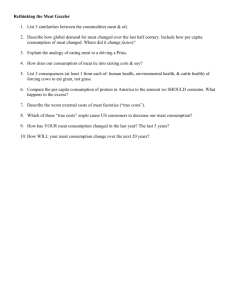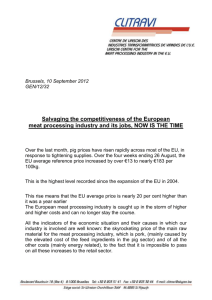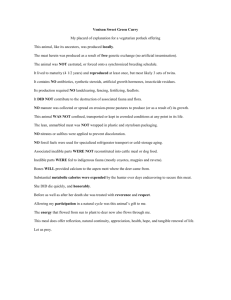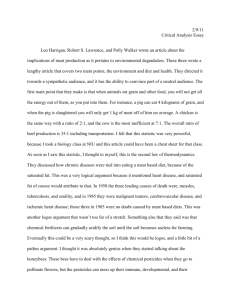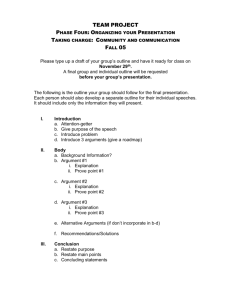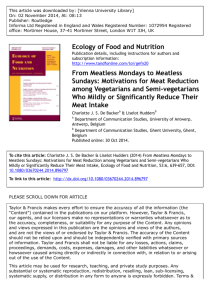Eating Habits, Animals, & the Environment
advertisement
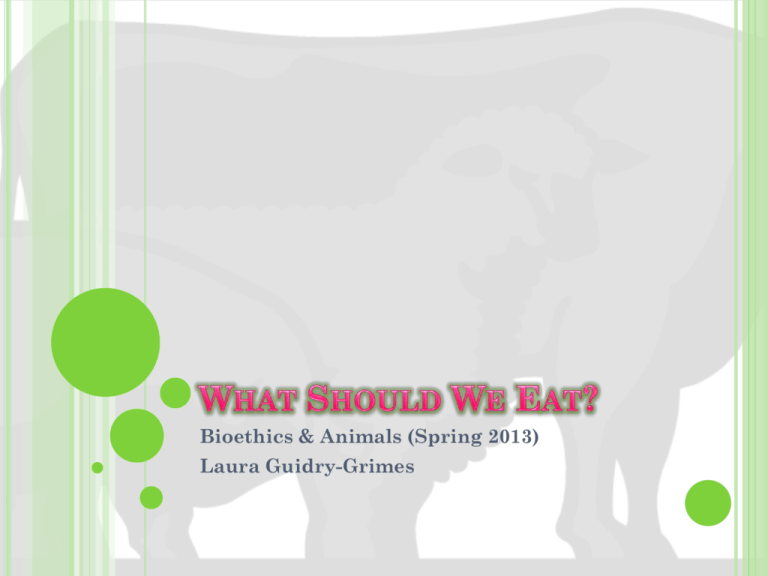
Bioethics & Animals (Spring 2013) Laura Guidry-Grimes INTRODUCTION VIDEO: FOOD, INC. (10:30-17:00) VIDEO: BEING A WEEKDAY VEGETARIAN U.S. Census Bureau ALWARD VS. BENATAR ON NAÏVE ARGUMENTS FOR & AGAINST MORAL VEGETARIANISM Vegetarian Thesis (VT): Eating the meat of an animal with properties X, Y, Z,…that was killed for the purpose of being eaten is morally wrong. Alward –defends Naïve Argument “Naïve” Argument against VT: If it is not morally wrong for other carnivores to kill and eat animals with properties X, Y, Z,…, then it is not wrong for us to kill and eat them either. Vegetarians would need to be committed to preventing natural predation and euthanizing carnivores in lieu of alternatives. Benatar –argues against Naïve Argument VT is not the only formulation of moral vegetarianism. There is a moral difference in the carnivorous habits of lions and most humans, and we should not always prevent unfortunate occurrences (like a deer being ripped apart by a lion). NON-ANTHROPOCENTRIC ARGUMENTS: REASONS TO END MEAT-EATING Problems with factory farming: Immobilized, incapacitated Obsessive, self-destructive behaviors Family separation; premature weaning Prevented from species-typical behavior Sickness, disability, mutilation Mal-nourishment (over- or underfed) Subjected to acts of cruelty Extreme pain without anesthesia Painful deaths ARGUMENT FOR COMPASSIONATE EATING Gap: How do we arrive at (4) from (3) ? 1) It is wrong to cause suffering unless there is a good (excellent) reason to do so. 2) Industrial farming causes billions of animals to suffering without good reason. 3) Therefore, industrial farming is wrong. 4) Therefore, you shouldn’t buy factory-farmed meat. Problem of dirty hands (participating and benefitting from wrongful enterprise) I am responsible for causing animals’ suffering as part of larger group of meat-eaters. My behavior could possibly make a difference to how much meat is produced in the future (and even a low probability is worth it). “Rethinking the Meat Guzzler” (2008) “Rethinking the Meat Guzzler” (2008) ANTHROPOCENTRIC ARGUMENTS: REASONS TO END MEAT-EATING Spread of new, drug-resistant infectious diseases Pollution of air, soil, water from animal waste, pesticides, fumes Overconsumes fossil fuels, water, and land Wastes food energy and resources Health problems due to antibiotic resistance, obesity, heart problems, cancer Harms those who live near plants, plant workers, small farming businesses, and international farmers ARGUMENT FROM CAUTION 1) Killing animals might be murder. 2) So, killing animals to obtain food is wrong. 3) So, we should be vegetarians. Do you find this argument compelling? Could it be applied to other spheres of animal use? DISCUSSION QUESTIONS What are the best arguments for continuing meat-eating? How compelling are aesthetic and cultural considerations? Do some people have a stronger obligation than others to change their eating habits? Rachels considers several ways to bridge the gap between the wrongfulness of killing animals to eat them and the obligation to be vegetarian. Which of these arguments do you find most convincing? PETA has compared our treatment of animals to the Holocaust. Do you find this comparison compelling? What might be problematic about using this analogy in animal advocacy? ADDITIONAL REFERENCES “Meat Consumption by Country” http://www.census.gov/compendia/statab/2012/tables/12s1377.pdf “Meat: Making Global Warming Worse” http://www.time.com/time/health/article/0,8599,1839995,00.html “How Meat Contributes to Global Warming” http://www.scientificamerican.com/article.cfm?id=the-greenhousehamburger “Coop D’Etat: Farmers, Humane Society Partner on ChickenCage Revolution” http://www.npr.org/blogs/thesalt/2012/01/26/145900751/ex-foesstage-coop-detat-for-egg-laying-chickens “Rethinking the Meat Guzzler” http://www.nytimes.com/2008/01/27/weekinreview/27bittman.htm l?pagewanted=all&_r=0 QUESTIONS? COMMENTS?
